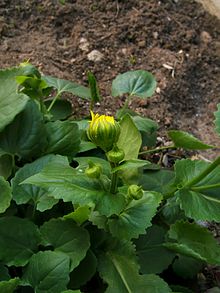Doronicum orientale
| Leopard's bane | |
|---|---|

| |
| Scientific classification | |
| Kingdom: | Plantae |
| Clade: | Tracheophytes |
| Clade: | Angiosperms |
| Clade: | Eudicots |
| Clade: | Asterids |
| Order: | Asterales |
| Family: | Asteraceae |
| Genus: | Doronicum |
| Species: | D. orientale
|
| Binomial name | |
| Doronicum orientale | |
| Synonyms[1] | |
| |

Doronicum orientale, the Oriental leopard's bane, is a European plant species in the family Asteraceae.
Description
[edit]Doronicum orientale is a perennial herb that has daisy-like yellow flower heads on long, straight stems, which attract nectar-eating insects. The plants grow to approximately 2 feet (60 cm) tall. The basal foliage is bright green with cordate leaves that have scalloped margins. Its native habitats include moist, rocky outcrops and woodland areas.[2]
Etymology
[edit]The specific epithet "orientale," means "eastern" and is in reference to its native range of eastern Europe,[2] not eastern Asia.
Distribution
[edit]It is native to southeastern Europe (Italy, Greece, the Balkans, Hungary, Moldova, Ukraine, southern European Russia)[3][4] and parts of southwest Asia (Turkey, South Caucasus).[5][6]
Cultivation
[edit]Doronicum orientale is widely cultivated as an ornamental.[7] There are a few reports of the species having escaped cultivation and been found growing wild in parts of Canada, but the plant apparently failed to become established there.[8] D. orientale is a hardy (to zone 3) perennial, blooming in early spring. It likes both shade and sun and is easily grown in moist, fertile soil. The plant attracts butterflies.[2] Cultivars include 'Little Leo', which is semi-double.
Toxicity
[edit]All parts of this plant are poisonous to humans.[9]
References
[edit]- ^ The Plant List, Doronicum orientale Hoffm.
- ^ a b c "Doronicum orientale 'Leonardo Compact' - Plant Finder". www.missouribotanicalgarden.org. Retrieved 8 November 2021.
- ^ Altervista Flora Italiana, Doronico orientale, Kaukasus-Gämswurz, gemsrot, Doronicum orientale Hoffm. includes photos and European distribution map
- ^ Plantarium, Doronicum orientale Hoffm. Описание таксона, Русскоязычные названия, Дороникум восточный Archived 18 July 2015 at the Wayback Machine in Russian with photos and partial distribution map
- ^ Royal Horticultural Society, Doronicum orientale, Caucasian leopard's bane
- ^ Karadeniz A, Çinbilgel I, Gün SŞ, Çetin A (2015). "Antioxidant activity of some Turkish medicinal plants". Nat Prod Res. 29 (24): 2308–12. doi:10.1080/14786419.2015.1005618. PMID 25649168. S2CID 42327987.
- ^ Naturegate, Leopard's Bane, Doronicum orientale
- ^ Flora of North America, Oriental leopard’s-bane, Doronicum orientale Hoffmann, Commentat. Soc. Phys.-Med. Univ. Lit. Caes. Mosq. 1: 8. 1808.
- ^ Pink, A. (2004). Gardening for the Million. Project Gutenberg Literary Archive Foundation.
 Media related to Doronicum orientale at Wikimedia Commons
Media related to Doronicum orientale at Wikimedia Commons Data related to Doronicum orientale at Wikispecies
Data related to Doronicum orientale at Wikispecies
